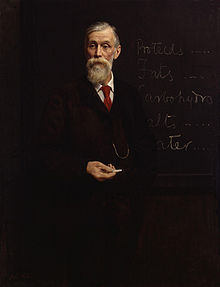- Michael Foster (physiologist)
-
For other people named Michael Foster, see Michael Foster (disambiguation).
Michael Foster 
Michael FosterBorn 8 March 1836
Huntingdon, EnglandDied 29 January 1907 (aged 70)
London, EnglandNationality British Fields Physiologist Institutions University College London
University of CambridgeAlma mater University College School Known for Textbook of Physiology (1876) Influences Thomas Henry Huxley
William SharpeyInfluenced John Newport Langley
Charles Scott Sherrington
Henry Newell Martin; Keith LucasSir Michael Foster (8 March 1836 – 29 January 1907) was an English physiologist.
He was born in Huntingdon, Cambridgeshire and educated at University College School, London.
After graduating in medicine at the University of London in 1859, he began to practise in his native town, but in 1867 he returned to London as teacher of practical physiology at University College London, where two years afterwards he became professor. In 1870 he was appointed by Trinity College, Cambridge, to its praelectorship in physiology, and thirteen years later he became the first occupant of the newly-created chair of physiology in the university, holding it till 1903.[1] One of his most famous students at Cambridge was Charles Scott Sherrington who went on to win the Nobel Prize in 1932.
He excelled as a teacher and administrator, and had a very large share in the organization and development of the Cambridge biological school. From 1881 to 1903 he was one of the secretaries of the Royal Society, and in that capacity exercised a wide influence on the study of biology in Britain. In 1899 he was created K.C.B., and served as president of the British Association at its meeting at Dover.
In the following year he was elected to represent the University of London in parliament. Though returned as a Unionist, his political action was not to be dictated by party considerations, and he gravitated towards Liberalism; but he played no prominent part in parliament and at the election of 1906 was defeated.
He was joint editor with E. Ray Lankester of The Scientific Memoirs of Thomas Henry Huxley.[2] His chief writings were a Textbook of Physiology (1876), which became a standard work, and Lectures on the History of Physiology in the 16th, 17th and 18th Centuries (1901), which consisted of lectures delivered at the Cooper Medical College, San Francisco, in 1900. He died suddenly in London.
References
 Foster by John Collier
Foster by John Collier
- ^ Foster, Michael in Venn, J. & J. A., Alumni Cantabrigienses, Cambridge University Press, 10 vols, 1922–1958.
- ^ Addison, Henry Robert; Oakes, Charles Henry; Lawson, William John; Sladen, Douglas Brooke Wheelton (1907). "FOSTER, Sir Michael". Who's Who, 59: p. 626. http://books.google.com/books?id=yEcuAAAAYAAJ&pg=PA626.
- Hawgood, Barbara J (Nov. 2008). "Sir Michael Foster MD FRS (1836-1907): the rise of the British school of physiology". Journal of Medical Biography (England) 16 (4): 221–6. doi:10.1258/jmb.2008.008009. ISSN 0967-7720. PMID 18952994.
 This article incorporates text from a publication now in the public domain: Chisholm, Hugh, ed (1911). Encyclopædia Britannica (11th ed.). Cambridge University Press.
This article incorporates text from a publication now in the public domain: Chisholm, Hugh, ed (1911). Encyclopædia Britannica (11th ed.). Cambridge University Press.
External links
- Obituary in The Journal of Physiology
- Hansard 1803–2005: contributions in Parliament by Michael Foster
- Biography and bibliography in the Virtual Laboratory of the Max Planck Institute for the History of Science
- Photograph of Sir Michael's residence, Nine Wells House, Great Shelford. This house used to have an extensive iris garden planted by Sir Michael, but the iris garden was lost during WW II.
Academic offices Preceded by
Thomas Henry HuxleyFullerian Professor of Physiology
1869–1972Succeeded by
William RutherfordParliament of the United Kingdom Preceded by
Sir John LubbockMember of Parliament for London University
1900–1906Succeeded by
Sir Philip MagnusCategories:- 1836 births
- 1907 deaths
- Academics of the University of Cambridge
- Academics of University College London
- Alumni of the University of London
- English agnostics
- English physiologists
- Fellows of Trinity College, Cambridge
- Fellows of the Royal Society
- Fullerian Professors of Physiology
- Knights Commander of the Order of the Bath
- Members of the United Kingdom Parliament for English constituencies
- Members of the United Kingdom Parliament for university constituencies
- Old Gowers
- People from Huntingdon
- UK MPs 1895–1900
- UK MPs 1900–1906
Wikimedia Foundation. 2010.
